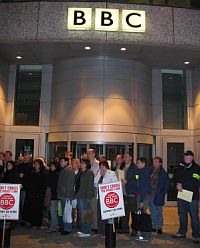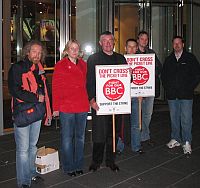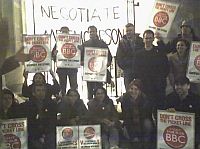BBC strike gets underway

The scene outside Television Centre shortly after the start of strike action.
Industrial action began at midnight on Sunday May 22, and runs until midnight on May 23.
Thousands more members will join the strike over the course of the day by refusing to turn up for work, and unions predict that the BBC will struggle to maintain many services as normal.
Picket lines have been formed already at major buildings that run 24 hours a day, particularly in West London where the BBC's news arm is based, and all TV channels are played out.
Live programmes, particularly news, are likely to be affected, and one of the day's major events, the Queen's visit to Chelsea flower show, will depend heavily on material pre-recorded on Sunday.
BECTU's Assistant General Secretary, Gerry Morrissey, said: "Members have come out across the country to support the strike, and production has stopped. We're expecting them to be joined by thousands more as the day progresses, and we are confident that live programming will be curtailed, or cut altogether."
Across the BBC, union members voted almost four to one in favour of industrial action when talks with management on cuts and privatisation broke down.
Thousands of BBC staff face redundancy, privatisation, or outsourcing, in the biggest shake-up in the Corporation's history, and those who remain are expected to take on extra duties.

Overnight picket line at Broadcast Centre, White City West London.
The package of change which prompted the strike is the personal brainchild of Director General Mark Thompson, who has said that the pain is necessary to convince the government to give the BBC another 10 years of licence-fee funding.
However, unions have accused him of over-reacting to political critics, and have pointed out that the preservation of the licence fee was written into a government green paper on the BBC's future, before Thompson announced nearly 4000 job cuts in March this year.

Industrial action at Bush House home of BBC World Service.
Morrissey said: "This should send a clear message to Mark Thompson to return to the bargaining table for meaningful negotiation, not just consultation." Today's stoppage could be the first of four if the BBC decides to sit tight, rather than get round the table with unions.
Two more dates for action have been named, May 31, and Jun 1, and unions have indicated that a fourth stoppage could be called later in June if necessary.
